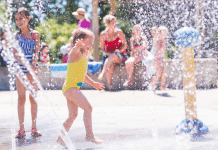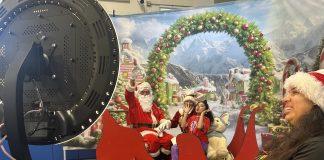As students across the country head back to school, Family Safety Day “Hanging with Heroes” event partner Safe Kids Worldwide has these back-to-school safety tips for families.
Safe Kids Worldwide, is a nonprofit organization dedicated to protecting children from unintentional injury— is reminding all parents and caregivers to make injury prevention part of their back-to-school plan.
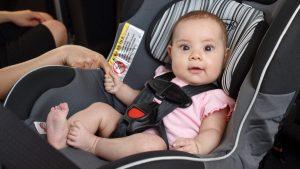 Child Passenger Safety Awareness Week is September 15-21, 2024, with September 21 highlighted as National Seat Check Saturday. We are thrilled to share that in partnership with Safe Kids Worldwide San Diego and State Farm, families can sign up for a FREE car seat safety check at our annual Family Safety Day “Hanging with Heroes” on Saturday, September 21st at Mission Valley Shopping Center. Interested families can sign up here for the free appointment and receive a FREE GA Family Ticket to the event!
Child Passenger Safety Awareness Week is September 15-21, 2024, with September 21 highlighted as National Seat Check Saturday. We are thrilled to share that in partnership with Safe Kids Worldwide San Diego and State Farm, families can sign up for a FREE car seat safety check at our annual Family Safety Day “Hanging with Heroes” on Saturday, September 21st at Mission Valley Shopping Center. Interested families can sign up here for the free appointment and receive a FREE GA Family Ticket to the event!
“The beginning of the school year can be an exciting time for families, but unfortunately, too many kids are injured on their way to and from school,” said Torine Creppy, president of Safe Kids Worldwide. “We know that these tragedies can be prevented with the right education, outreach, and awareness efforts. Our goal is to provide parents and caregivers with tips and tools to keep children safe as they walk, bike, or ride to school.
Safe Kids Worldwide’s Top Tips for Staying Safe Include:
Pedestrian Safety
Unintentional pedestrian injuries are the fifth leading cause of injury-related death in the United States for children ages 5 to 19, with teens being at the highest risk. Top tips include:
-
- Teach kids to look left, right and left again before crossing the street. Then remind them to continue looking until safely across.
- Make sure kids put phones, headphones, and devices down when crossing the street. It is particularly important to reinforce this message with teenagers.
- It’s best to walk on sidewalks or paths and cross at street corners, using traffic signals, and crosswalks. If there are no sidewalks, walk facing traffic as far to the left as possible. More pedestrian safety tips here.
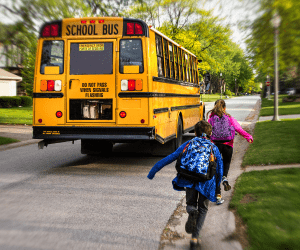 School Bus Safety
School Bus Safety
School buses are the most regulated vehicles on the road, designed to be safer than passenger vehicles in preventing crashes and injuries, but injuries involving school buses still happen. Top tips include:
-
- Walk with your kids to the bus stop and wait with them until it arrives. Remind kids to stand at least three giant steps back from the curb as the bus approaches and board the bus one at a time.
- Teach kids to wait for the bus to come to a complete stop before getting off and never to walk behind the bus.
- If your child needs to cross the street after exiting the bus, they should take five giant steps in front of the bus, make eye contact with the bus driver, and cross when the driver indicates it’s safe. More bus safety tips here.
Bicycle Safety
Safe Kids Worldwide’s simple advice, “Use your head, wear a helmet,” focuses on the most effective way to reduce head injury and death from bicycle crashes, but there are other important tips to share with kids before they pedal off.
-
- Make sure your child has the right size bike: When children are sitting on the seat of the bicycle, their feet should be able to touch the ground.
- Before the ride, make sure the reflectors are secure, brakes work properly, gears shift smoothly, and tires are tightly secured and properly inflated.
- Long or loose clothing can get caught in bike chains or wheel spokes. Dress young kids appropriately to ensure a safe ride. More bike safety tips for riders—and drivers—here.
Booster Seat Safety
Many school-age kids still need to travel in a booster seat; children seated in a booster seat in the back seat of the car are 45% less likely to be injured in a crash than children using a seat belt alone. Top tips include:
-
- When your child is seated in a booster, make sure the lap and shoulder belts fit. The seat belt must lie flat across your child’s chest, on the bony part of the shoulder and low on the hips or upper thighs.
- Do not place the shoulder belt under the child’s arm or behind the child’s back.
- Be sure you ask about booster use if your child is in a carpool. More tips on booster safety here.
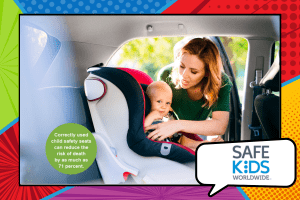 Check out Safe Kids Worldwide San Diego for essential back-to-school safety tips and other valuable resources on preventing childhood injuries. Then, join San Diego Moms on Saturday, September 21st, for Family Safety Day—a one-stop event packed with crucial safety insights and resources for families, covering everything from CPR techniques and car seat safety to navigating the digital world safely. Sign up to get your car seat checked at the event here.
Check out Safe Kids Worldwide San Diego for essential back-to-school safety tips and other valuable resources on preventing childhood injuries. Then, join San Diego Moms on Saturday, September 21st, for Family Safety Day—a one-stop event packed with crucial safety insights and resources for families, covering everything from CPR techniques and car seat safety to navigating the digital world safely. Sign up to get your car seat checked at the event here.









